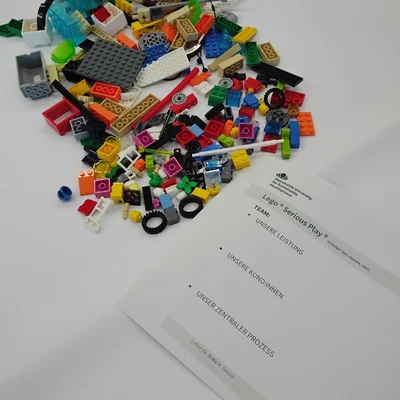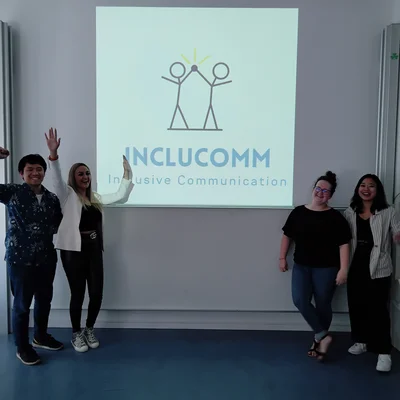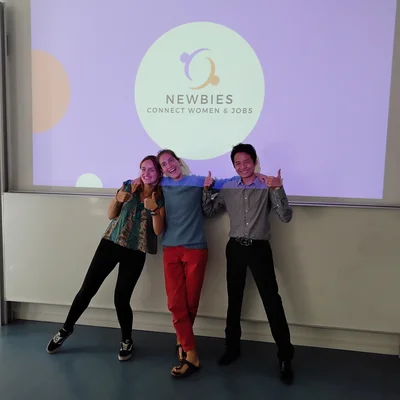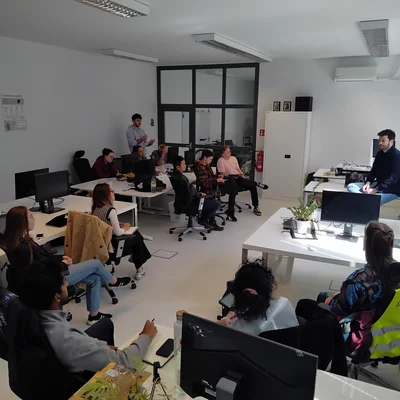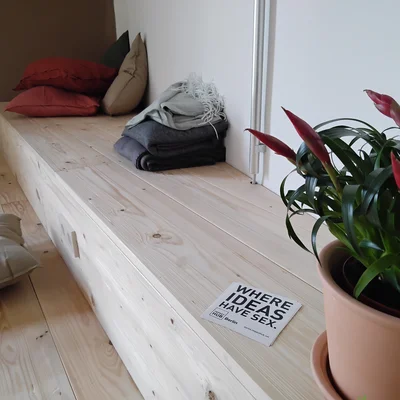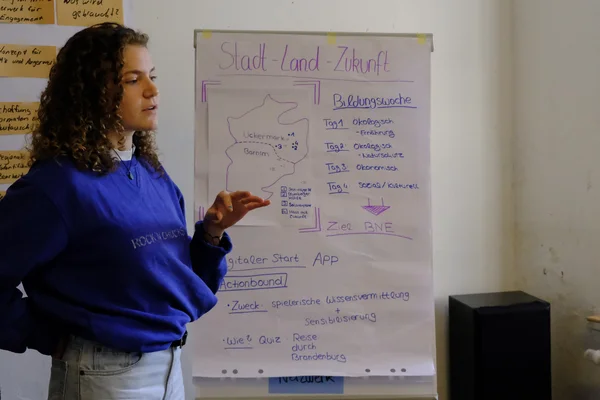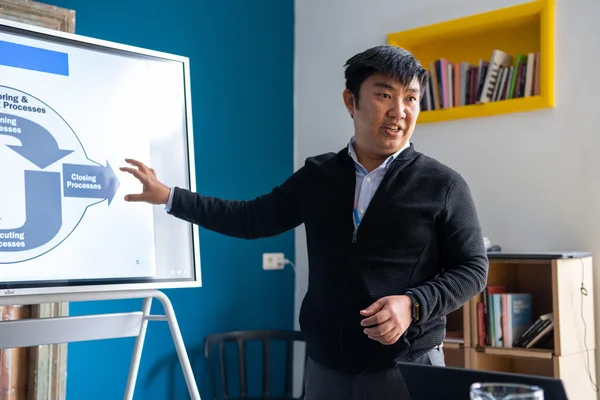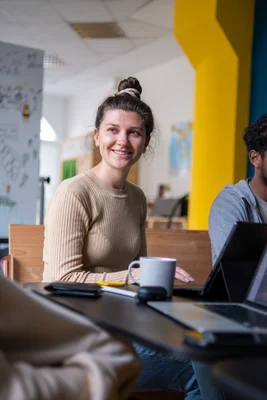Individual study content
Your studies are an individual learning journey towards a sustainable socially entrepreneurial thinking and acting personality. In the Social Innovation Project (SIP), this begins with exploring your own personality to form a team and analyse a problem of your own choosing. Building on this, you develop and test sustainable social ideas that you mature into a commercially viable concept. It is evaluated in an impact-oriented way and put into practice. Elective and in-depth modules as well as intercultural experiences flank your path.
Modules per semester
In the first semester, you will form competence-based teams and use collaborative creativity techniques and in-depth problem analysis to search for topics for your social innovation projects. You will also deal with personal, intercultural and macro-economic aspects of social transformation.
The module teaches you the basics and application-specific aspects of team dynamics and team learning processes and promotes the development of individual and collective creativity. The acquired team-oriented learning and personal competences contribute to the overall goal of all six SIP modules.
You will develop your analytical skills by working independently on both a theoretical research question and a practical complex problem analysis using scientific knowledge and methodology. The problem analysis is closely linked to the brainstorming in SIP 1.
In a combination of theory and practical examples, you will learn about regional economic problems and development approaches. Using design thinking, you as students will then develop your own socially effective ideas to address problems in rural areas of Brandenburg.
In this module we shed light on the macro-economic framework conditions under which sustainable economic activity can take place. You get to know concepts, strategies and approaches to action for shaping sustainable development from different perspectives to promote your systemic thinking.
The aim of this module is to develop personal and intercultural competences. Self-assessment exercises in the context of intercultural learning and working conditions will enhance your cognitive and behavioural skills for respectful and effective intercultural communication.
The module serves as a shell module for study programmes on current topics from theory and practice. These include modules such as Sustainable Design or Economics of Happiness. In addition to courses offered by the HNEE, you can choose suitable courses offered by other Master's degree programmes in Germany and abroad.
In the second semester, you will hone your entrepreneurial mindset while developing prototypes and business plans from your ideas in the Social Innovation Project. In further modules, you will develop normative narratives of a more sustainable future and learn what role digitalisation can play in social transformation.
The module serves as a shell module for study programmes on current topics from theory and practice in English. These include modules such as Sustainable Design or Economics of Happiness. In addition to courses offered by the HNEE, suitable courses offered by other Master's degree programmes in Germany and abroad can be selected.
Get out of the seminar room. With design thinking, you iteratively develop a prototype from your innovation idea by analysing the needs, expectations and willingness to pay of potential customers. In this process, the focus is on direct interaction with customers and partners from practice.
Based on your idea, you will develop a commercially viable impact-oriented concept with all relevant aspects (business idea, team, market analysis, marketing and sales, company & organisation, financial planning, financing) in dialogue with practice partners and finally pitch to a jury of experts.
Organisational, technological and social innovations help solve some of the world's most pressing problems. You will explore these potentials during an excursion and learn what role digitalisation can play for a social transformation.
The module opens up a creative, collaborative learning space for you to create narratives of a better future using scenario techniques. Through cooperation with universities in countries of the Global South, this module is international and multi-perspective.
In the third semester, the focus is on publicly effective communication, financing, scaling and measuring the success of social innovations. In the course of the Social Innovation Projects, you will launch a crowdfunding campaign for your innovation idea and concretely implement a first pilot project in practice.
You will implement your social business idea in pilot projects with the involvement of practical partners. In addition, you will apply for funding in a business plan competition. You will learn methods of systemic coaching and apply them in advising other student teams.
You evaluate your social entrepreneurial activities through field research and calculate the social impact of your SIP. In addition, you will make calculations on possible scaling and its impact on profitability and social impact and present the collected results in the form of a crowdfunding campaign.
The module teaches you the most important instruments of communication and marketing of social innovations and shows the importance of authentic brand strategy, pricing and integrated marketing communication using practical examples. Based on what you have learned, you will develop a marketing campaign for social practice partners.
With sustainable and innovative human resources management, you can master the challenge of attracting qualified and motivated employees and retaining them in the long term.
Social impact and sustainable management are increasingly crucial for corporate success. You will be introduced to various sustainability reporting frameworks and learn to apply instruments and methods of impact measurement and controlling.
The module serves as a shell module for study programmes on current topics from theory and practice. These include modules such as Sustainable Design or Economics of Happiness. In addition to courses offered by the HNEE, you can choose suitable courses offered by other Master's degree programmes in Germany and abroad.
In the fourth semester, the individual learning journey culminates in a final reflection with the help of a business game and the writing of a Master's thesis, the writing process of which is accompanied by a colloquium to guide the most important steps and methods of scientific work.
In this module, the focus is on the playful teaching of the specifics of a public welfare-oriented start-up. The entire learning journey of your studies through the Social Innovation Projects is to be reflected on here once again.
You write your Master's thesis either in connection with your Social Innovation Projects or on any topic that is compatible with the contents of the degree programme. As teaching staff, we will guide you. You will present your results on an ongoing basis as part of a colloquium.
FAQ study contents
No, the students choose the topics independently in the course of the first semester in their groups.
In principle, it is possible to incorporate already existing ideas into the SIP. However, all ideas must be worked on in groups. Students with already existing ideas must therefore convince other students to work together on their idea. In principle, however, you do not need to bring an idea with you; they are developed together.
No, the students choose their groups independently in the course of the first semester.
Yes, at the beginning of the second semester there is the option to change teams, but it is mandatory to continue working in teams during the second semester. At the beginning of the third semester, there is another option to change teams; from here on, individuals can also work on a project idea.
Yes, at the beginning of the second semester there is the option to change the topics, but it is mandatory to continue working in teams during the second semester. At the beginning of the third semester, there is another option to change the topics; from here on, individuals can also work on a project idea.
The SESIN is a full-time programme in which attendance is important due to the project-based learning approach. A part-time job is not ruled out in principle, but should be well considered and the time should be as flexible as possible in order to be able to meet the requirements of the study programme.
A consecutive Master's degree is a follow-up degree that usually builds on a Bachelor's degree in the same subject area. In the case of SESIN, this means that the programme is essentially business-oriented, despite connections to other social science disciplines.
The module serves as a shell module for study programmes on current topics from theory and practice. These include modules such as Sustainable Design, Economics of Happiness or research seminars on Social Entrepreneurship and Social Innovation. In addition to courses offered by the HNEE, students can also choose suitable courses from other Master's programmes in Germany and abroad.
A semester abroad at SESIN is best completed in or after the third semester. Partnerships with suitable exchange universities in Europe and overseas exist and are being further developed.
